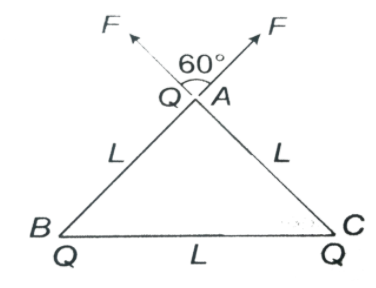
Three identical particles each of mass $m$ are placed at the corners of the equilateral triangle at side $a$. Find the gravitational force exerted on one body due to the other two.
Answer
233.1k+ views
Hint: We have an equilateral triangle whose all angles are equal to $60^\circ $ . We have to use the formula of gravitational force which is equal to $\overrightarrow F = G\dfrac{{Mm}}{{{r^2}}}$. After that for net force add both the forces which act on it due to both sides.
Complete step by step solution:
We have an equilateral triangle whose all sides are equal and angles are of $60^\circ $. Now let $L = a$ be the side of a triangle.

Here all the particles are of the same mass as $m$.
We will use Newton's laws to solve this question. Newton's law of universal gravitation says that every particle attracts every other particle in the universe with a force that is directly proportional to the product of their masses and inversely proportional to the square of the distance between their centers. Therefore,
$\overrightarrow F = G\dfrac{{Mm}}{{{r^2}}}$
Now put the values, calculate magnitude of force due to particle B, we get
${\overrightarrow F _1} = G\dfrac{{{m^2}}}{{{r^2}}}$
Now calculate magnitude of force due to particle C, we get
${\overrightarrow F _2} = G\dfrac{{{m^2}}}{{{r^2}}}$
Now, we are given that both the forces are at $60^\circ $ . Therefore net force is equal to
$\overrightarrow {{F_{net}}} = \overrightarrow {{F_1}} + \overrightarrow {{F_2}} $
And the magnitude of this net force will be
$ \Rightarrow \sqrt {{F^2}_1 + {F_2}^2 + 2{F_1}{F_2}\cos 60°} $
After putting the value of $\cos 60$ , we get
$ \Rightarrow \sqrt {{F^2} + {F^2} + 2{F^2} \times \dfrac{1}{2}}$ (since $\cos 60° = \dfrac{1}{2}$ )
$ \Rightarrow \sqrt {3{F^2}} $
Hence, we get the net force equal to
${F_{net}} = \sqrt 3 F$
And lastly put value of $F$ to get the final answer
${F_{net}} = \sqrt 3 G\dfrac{{{m^2}}}{{{r^2}}}$
This is the value asked in the question.
Note: Always remember about the units of quantities. Here, the mass of all the particles is the same so refer to them with the same name and also remember that force is a vector quantity so direction matters.
Complete step by step solution:
We have an equilateral triangle whose all sides are equal and angles are of $60^\circ $. Now let $L = a$ be the side of a triangle.

Here all the particles are of the same mass as $m$.
We will use Newton's laws to solve this question. Newton's law of universal gravitation says that every particle attracts every other particle in the universe with a force that is directly proportional to the product of their masses and inversely proportional to the square of the distance between their centers. Therefore,
$\overrightarrow F = G\dfrac{{Mm}}{{{r^2}}}$
Now put the values, calculate magnitude of force due to particle B, we get
${\overrightarrow F _1} = G\dfrac{{{m^2}}}{{{r^2}}}$
Now calculate magnitude of force due to particle C, we get
${\overrightarrow F _2} = G\dfrac{{{m^2}}}{{{r^2}}}$
Now, we are given that both the forces are at $60^\circ $ . Therefore net force is equal to
$\overrightarrow {{F_{net}}} = \overrightarrow {{F_1}} + \overrightarrow {{F_2}} $
And the magnitude of this net force will be
$ \Rightarrow \sqrt {{F^2}_1 + {F_2}^2 + 2{F_1}{F_2}\cos 60°} $
After putting the value of $\cos 60$ , we get
$ \Rightarrow \sqrt {{F^2} + {F^2} + 2{F^2} \times \dfrac{1}{2}}$ (since $\cos 60° = \dfrac{1}{2}$ )
$ \Rightarrow \sqrt {3{F^2}} $
Hence, we get the net force equal to
${F_{net}} = \sqrt 3 F$
And lastly put value of $F$ to get the final answer
${F_{net}} = \sqrt 3 G\dfrac{{{m^2}}}{{{r^2}}}$
This is the value asked in the question.
Note: Always remember about the units of quantities. Here, the mass of all the particles is the same so refer to them with the same name and also remember that force is a vector quantity so direction matters.
Recently Updated Pages
JEE Main 2023 April 6 Shift 1 Question Paper with Answer Key

JEE Main 2023 April 6 Shift 2 Question Paper with Answer Key

JEE Main 2023 (January 31 Evening Shift) Question Paper with Solutions [PDF]

JEE Main 2023 January 30 Shift 2 Question Paper with Answer Key

JEE Main 2023 January 25 Shift 1 Question Paper with Answer Key

JEE Main 2023 January 24 Shift 2 Question Paper with Answer Key

Trending doubts
JEE Main 2026: Session 2 Registration Open, City Intimation Slip, Exam Dates, Syllabus & Eligibility

JEE Main 2026 Application Login: Direct Link, Registration, Form Fill, and Steps

Understanding the Angle of Deviation in a Prism

Hybridisation in Chemistry – Concept, Types & Applications

How to Convert a Galvanometer into an Ammeter or Voltmeter

Understanding Uniform Acceleration in Physics

Other Pages
JEE Advanced Marks vs Ranks 2025: Understanding Category-wise Qualifying Marks and Previous Year Cut-offs

Laws of Motion Class 11 Physics Chapter 4 CBSE Notes - 2025-26

Waves Class 11 Physics Chapter 14 CBSE Notes - 2025-26

Mechanical Properties of Fluids Class 11 Physics Chapter 9 CBSE Notes - 2025-26

Thermodynamics Class 11 Physics Chapter 11 CBSE Notes - 2025-26

Units And Measurements Class 11 Physics Chapter 1 CBSE Notes - 2025-26




